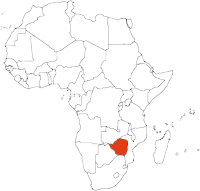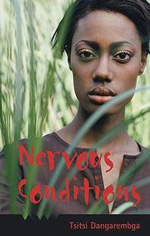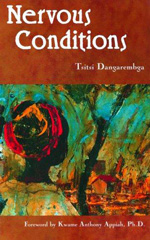
 "I was not sorry when my brother died." So begins Tsitsi Dangarembga's coming-of-age novel, Nervous Conditions.
Set in 1960s Rhodesia, Nervous Conditions is the story of Tambu, a girl from a poverty-stricken family who is given the chance,
by her wealthy uncle, to gain an education.
"I was not sorry when my brother died." So begins Tsitsi Dangarembga's coming-of-age novel, Nervous Conditions.
Set in 1960s Rhodesia, Nervous Conditions is the story of Tambu, a girl from a poverty-stricken family who is given the chance,
by her wealthy uncle, to gain an education.
Tambu's brother, Nhamo, is the first in a long line of men who treat her poorly. He orders her to do his work and mocks her desire to attend school, and it is no surprise that Tambu is not upset when Nhamo succumbs to the mumps. His treatment of his sister stems from their father's example: Jeremiah, a lazy, self-indulgent man, has spent the nineteen years of his marriage crushing his wife's spirit. And despite giving Tambu an education, Jeremiah's brother Babamukuru treats his own daughter with cruelty, exposing her to English ways but then disapproving when she does not follow African customs.
Tambu's world is not a pretty one; she describes her childhood as a time of ignorance, when she longed to learn. Her education, however, is far from the positive experience she envisions. Life at Babamukuru's merely solidifies her inferior place in society. Tambu realizes that she is "a victim of her femaleness….Femaleness as opposed and inferior to maleness." It is not poverty that holds her back, but her status as a woman.
Dangarembga's novel is an important one, not only for its place in African literature, but for its treatment of women. Tambu's views on gender and society are enlightening, and it is fascinating to follow her education. Men and women are depicted as stark opposites, each with their own role to fulfill. Women who are not happy with the traditional view of femininity, such as Babamukuru's daughter Nyasha, find rebellion a difficult path to follow. Nyasha's continuous struggle with her father and the customs he values conflict with Tambu's initial desire to make her family proud. As the two girls grow closer, Tambu wrestles with her opinion of her uncle, who she sees as a god-like persona. Paralleling this gender struggle are colonial tensions; Babamukuru is seen as a "worthy" African by the British missionaries, and Tambu's uneducated parents are at the mercy of their wealthy relatives.
Nervous Conditions depicts a society in conflict, one where ideas of gender, race, and customs are evolving. It is a novel of opposites—man vs. woman, white vs. black, wealthy vs. poor, tradition vs. progression, educated vs. uneducated. Tambu negotiates these opposing ideas while striving to rise above her lowly position, determined not to let her status as a woman hold her down.


Lynne Rienner Pub/Ayebia Publishers, paperback, 9780954702335
Seal Press, paperback, 9781580051347